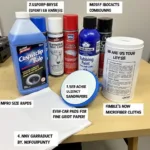Car body & alloy wheel repairs are essential for maintaining your vehicle’s appearance and structural integrity. From minor scratches to significant dents and alloy wheel damage, understanding the repair process and finding reputable professionals is crucial. This guide will cover everything you need to know about car body and alloy wheel repairs, ensuring you make informed decisions and get your vehicle back in top condition.
Choosing the right repair shop for your car body & alloy wheel repairs can be a daunting task. Factors such as the severity of the damage, the type of repair required, and the reputation of the shop should all be taken into consideration. Let’s delve into the specifics of these repairs and discuss how to select a qualified professional. You can find reputable car body and alloy wheel repair services in various locations, such as those offered by alloy wheel specialist & car body repairs stourbridge.
Understanding Car Body Repairs
Car body repair encompasses a range of services designed to restore a vehicle’s exterior to its pre-accident or damaged condition. This can include anything from minor scratch and dent removal to major collision repair.
Types of Car Body Damage and Repair Methods
- Minor Scratches and Scuffs: Often addressed with paint touch-ups or polishing.
- Dents: Paintless dent repair (PDR) is a popular method for removing minor dents without repainting. More significant dents may require traditional body filler and repainting.
- Rust Repair: Rust can significantly compromise the structural integrity of a vehicle. Repair involves removing the rust, treating the affected area, and applying a protective coating.
- Major Collision Repair: This often involves replacing damaged panels, frame straightening, and repainting.
Alloy Wheel Repairs: Maintaining Appearance and Performance
Alloy wheels are susceptible to damage from potholes, curbs, and general wear and tear. Repairing alloy wheels not only enhances your vehicle’s appearance but also ensures optimal performance and safety.
Common Alloy Wheel Damage and Repair Techniques
- Scratches and Scuffs: Minor cosmetic damage can often be addressed through wheel refinishing.
- Gouges and Chips: Deeper damage may require welding or filling before refinishing.
- Cracks: Depending on the severity and location of the crack, welding or wheel replacement may be necessary.
- Bent Wheels: Specialized equipment can be used to straighten bent alloy wheels.
For specific services like auto detailing and body repairs, you might want to consider options like auto one car body repair & detailing.
Choosing the Right Repair Shop
Selecting a reputable repair shop is crucial for ensuring a high-quality repair.
Key Factors to Consider
- Experience and Expertise: Look for shops specializing in the type of repair you need.
- Reputation and Reviews: Check online reviews and testimonials.
- Equipment and Technology: Modern equipment can ensure a precise and efficient repair.
- Warranty and Guarantees: Reputable shops will stand behind their work.
“A thorough assessment of the damage is paramount,” says John Smith, Senior Automotive Technician at Smith Auto Repair. “This ensures the right repair method is chosen for optimal results.”
How much do car body & alloy wheel repairs cost?
The cost of car body & alloy wheel repairs varies depending on the extent of the damage and the specific repair methods used. Minor scratches might only require a touch-up costing a few tens of dollars, while significant collision damage could run into thousands. Alloy wheel repairs can range from around $50 for minor scratch repairs to over $200 for more complex issues like crack repairs or wheel straightening.
If you’re looking for car body repairs in specific locations, you can explore options such as car body repairs in leek or consider alloy wheel and car body repair services in other areas, like those available in Sunderland car body & alloy wheel repairs sunderland. Repairing a hole in your car body can be a specialized task; hence, understanding car body hole repair can be beneficial.
“Using quality materials and adhering to industry best practices ensures a long-lasting repair,” adds Jane Doe, Lead Paint Specialist at Doe Auto Body. “This prevents future issues and maintains the vehicle’s value.”
Conclusion
Car body & alloy wheel repairs are essential for preserving your vehicle’s appearance, performance, and value. By understanding the various repair methods and choosing a qualified repair shop, you can ensure a high-quality repair that restores your vehicle to its former glory.
FAQ
- How long do car body repairs take? The timeframe depends on the severity of the damage, ranging from a few hours to several days.
- Can I repair alloy wheels myself? While minor scratches can be addressed with DIY kits, more complex repairs are best left to professionals.
- How do I prevent alloy wheel damage? Careful driving, avoiding potholes, and regular cleaning can help prevent damage.
- Does car insurance cover car body repairs? Coverage depends on your specific insurance policy.
- How often should I have my car body inspected for rust? Regular inspections, especially in areas prone to salt or moisture, are recommended.
- What is the best way to clean alloy wheels? Use a dedicated wheel cleaner and soft brush to avoid scratching.
- How do I choose the right paint color for touch-ups? Refer to your vehicle’s owner’s manual or consult a professional for an exact match.
Common Car Body & Alloy Wheel Repair Scenarios
- Scenario 1: Minor scratch on the car door from a shopping cart.
- Scenario 2: Curb rash on an alloy wheel.
- Scenario 3: Dent on the fender from a minor collision.
- Scenario 4: Rust forming on the rocker panels.
- Scenario 5: Cracked alloy wheel from hitting a pothole.
Further Reading and Resources
- Articles on specific car body repair techniques.
- Guides on choosing the right alloy wheel cleaner.
- Resources on car insurance coverage for body repairs.
Need help with your car body & alloy wheel repairs? Contact us via WhatsApp: +1(641)206-8880 or Email: [email protected]. Our 24/7 customer support team is ready to assist you.

